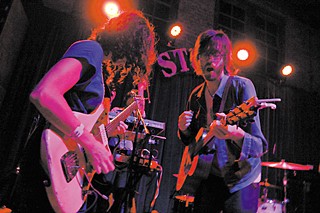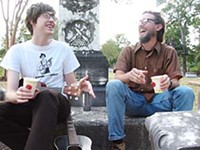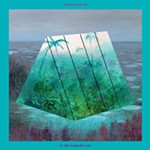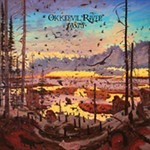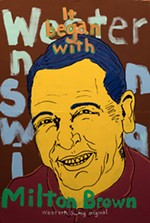Darkness in the Heart of Town
Okkervil River's Will Sheff returns home
By Michael Corcoran, Fri., Sept. 6, 2013

His grandfather, 90, was running out of time, so Will Sheff made the five-and-a-half-hour drive from Brooklyn to his grandparents' home in New Hampshire often while writing songs for Okkervil River's difficult departure LP I Am Very Far in 2011. The three would eat breakfast together, then Sheff would vanish into the room above the garage until dusk, writing in isolation. The day would conclude with dinner and drinks, a routine that the songwriter, who was painstakingly drawing his lyrics from a more subconscious place than previously, found as comforting as he did his relatives.
One day after breakfast, he went to his car instead of the garage office. On a whim, he drove 65 miles to Meriden, the small, quaint hamlet where he grew up. It had been 15 years since the last visit, and Sheff wanted to linger in his past for a few hours and maybe soak up some childhood memories – good and bad – that might spark a new song or rejuvenate one stuck on the side of the road.
Sheff gets so wrapped up in his projects he sometimes secretly wishes he had amnesia so he could go back and listen to all his old albums from the perspective of a new fan. This time, he wanted to go back for a fresh look at "the invisible town that doesn't exist," which is how he thought of Meriden, with its two TV channels (PBS and CBS) and the nearest record store 40 miles away during his youth.
"A big explosion happened in my brain," recalls Sheff of his return to the place where he had felt both alienated and nourished. Unchanged, Meriden made the now-37-year-old musician feel as though he'd never left – never went off to college in Minnesota, never moved to Austin in the late Nineties to start a band. "When I was writing I Am Very Far, I was thinking a lot about the endings of things. I was thinking about death and loss and when things are broken in a way that can't be fixed. And somewhere along that process, I came to realize that I was thinking just as much about the beginnings of things."
Sheff climbed French's Ledges, the small mountain that overlooks the town, and felt a strange spiritual tug.
"I was walking through those woods that I remember so well, but the overwhelming feeling I got was that the woods remembered me. That's when I started thinking that maybe I should've made a childhood autobiography record instead of I Am Very Far."
He's sitting this afternoon at the downstairs bar in Stubb's, where Okkervil River will later shake the rust off a two-year hiatus with a hastily announced tour send-off. New album The Silver Gymnasium, the band's first for NYC-based ATO Records (My Morning Jacket, Alabama Shakes), has prompted furious cramming and jamming all week since Sheff lives in Brooklyn and the rest of the group resides in Austin.
"Of course, sometimes I wish we all lived in the same town and could play together whenever we wanted to," says guitarist Lauren Gurgiolo, who joined in time for The Stand Ins tour in 2008. "But I also love the intensity of practicing five hours a day for seven days in a row."
It's a cycle the five local bandmembers have gotten used to in the seven years since Sheff moved away to start a new phase of his growth and live closer to his parents and grandparents. Between albums and tours, the members of Okkervil River make ends meet playing in obscure local bands, but then the cycle starts again and they spend months on the road being treated like rock stars, especially when fans like Bruce Springsteen and Lou Reed stand in the stage wings to watch them perform.
When the band and producer John Agnello, chosen for recent work with Kurt Vile and engineering on Eighties albums by Cyndi Lauper and others, settled into David Boyle's Church House Studios in East Austin to record The Silver Gymnasium, Sheff put his 1982 Conan the Barbarian action figure, still in the box, in the vocal room. The placement wasn't to get him in the mood to sing about childhood memories. Rather, Conan's accompanied Sheff on every Okkervil River recording since 1998's debut Bedroom EP, and most notably for band's quartet of great LPs – 2002's Don't Fall in Love With Everyone You See, 2005's Black Sheep Boy, 2007's The Stage Names and 2008's The Stand Ins – cut with Austin producer Brian Beattie. This favorite childhood toy had become Sheff's studio guardian, the singer as superstitious about it as a major league baseball player is about his lucky bat. One morning he arrived to find Boyle holding it and asking if it was his.
"Yeah, that's mine," said Sheff. "But it had been unopened."
Boyle was mortified. The evening before, his five-year-old son had found the box and asked an intern to open it for him.
"I am so, so sorry," Boyle gushed, but Sheff just shrugged.
"Well, I guess it was just time for someone to open that box."
Down Down the Deep River
"You're spit into the center of your hometown," sings Sheff at the start of "Down Down the Deep River," which pairs with "Pink-Slips" to form Gymnasium's spiritual core. "Deep River" swells like radio-friendly Springsteen, but there's something ominous going on. Are the kids in the tent telling ghost stories or are they describing real events?
"And as the rescue party, the volunteer team – they're just kids of 18 and it's the worst thing they've seen," he sings over a hypnotic groove. "We can never go back; we can only remember."
It's a song joyous and mournful all at once.
"That song, after I wrote it, I was high on life for a week," says Sheff. "It summed up something I wanted to say about my whole life, about my childhood and myadulthood and my friends and my town. That song is supposed to feel happy and sad, like my childhood.
"Nostalgia is a cleaned-up, airbrushed version of memory. I wanted to cop to that on some level, because I find myself getting nostalgic for things I know I was unhappy doing."
Given the surge of opening ear-pleaser "It Was My Season" and "Stay Young," Sheff says he used Eighties power ballads and songs like the Outfield's "Your Love" as a model for "that fake grandeur" – delivered with a bit of a wink.
"We can be mature with the audience, like, 'We're making a song you can pump your fist to at the race track.'"
"Deep River" is followed by "Pink-Slips," a song like nothing Okkervil River has recorded before, with accents from an old AM radio melody and corny sonic frills. Sheff's vocals are tough. "Nine years down in Texas/With sluts of both sexes/Liars, lumps, and drug addicts, and drunks/I love my friends," he sings, breaking from New Hampshire 1986.
"I wanted to write about places in your childhood that you could relate to no matter where you grew up," explains Sheff. "I think the way to do that is to be more specific. The more I write about New Hampshire, the more it reminds you of Texas."
The Okkervil rhythm section of drummer Cully Symington and bassist Patrick Pestorius grew up in Austin and, Sheff says, they've expressed the same sort of love and bitterness for their hometown as he does for Meriden.
There are references to Atari games and taping songs off the radio, which is how Sheff owned many of his favorite songs by Hall & Oates, Fleetwood Mac, Phil Collins, and others.
"[But] I didn't want to make a pastiche record on the sounds of the Eighties," he asserts. "I wanted to take the sonic philosophies of the Eighties and adapt that to a modern palette."
Born on the Seventh of July
Sheff's a Bicentennial Baby, born July 7, 1976, to a pair of school teachers.
"I was a moody kid. I'd been very, very sick and grew up in the atmosphere of being aware of a high level of anxiety."
When he was 18 months old, he was diagnosed with life-threatening epiglottitis, which was treated with a tracheal tube.
"My parents had to clean out the trach tube every day and I had to sleep a certain way or I would suffocate," he states. "I was just a physically fragile child after that. I had severe asthma. Often I would turn blue and have to be rushed to the hospital."
Sheff's mother had suffered a miscarriage before Will, so, he says, "I was a golden boy. They really roll out the red carpet when you're the oldest." His first time onstage was as Baby Jesus in a Christmas pageant.
"When I went off to school, I realized the brutal truth, which is that I was a spazzy, weird kid with terrible social skills. Not good at sports, not good at relating with other kids."
He became a target of the rough farm kids he went to elementary and middle school with.
"My life was made very miserable by them, but at the same time, I was in a very beautiful place," recalls Sheff. "I loved where I lived. I had a rich imagination. My parents were wonderful."
The idea for a major work about Meriden, New Hampshire, 1986, actually goes back to Sheff's high school days. He attended and lived at the exclusive Kimball Union Academy boarding school (founded in 1813), whose nearly $50,000 a year tuition has led some writers to characterize Sheff as being a child of privilege.
"That really makes me angry when I read it," he bristles. "I went to Kimball for free because my parents taught there."
Sheff credits KUA teacher Simon Harrold with encouraging his literary ambitions. Harrold had a giant bookshelf in his study and when Sheff visited, he'd be prescribed literature.
"He'd go, 'Oh you like Dylan Thomas, well then you should read Ulysses.' I had a hard time with James Joyce as a 16-year-old, but I would read everything he suggested because it was important to me to be a writer. It's like if I wanted to be a gymnast, I would have to do a lot of exercise in my spare time."
Though Sheff doesn't go into deeper meanings of his work in interviews, the gymnasium of the title, built in 1914 and named after Charles Silver, could refer to the place where one puts in work as a young person to develop into the kind of artist/athlete they wish to become.
"One of the things about a lot of the stuff I was reading that struck me was the regionalism," says Sheff. "Under Milk Wood, by Dylan Thomas, which was a radio play, really rung true with me about what my town was like. And Twin Peaks was a big show for me, really all of David Lynch's stuff. I started to recognize that my town is a neat, small place where all these stories and interesting characters could come from."
As a sophomore at Kimball, Sheff began writing stories based on the people and places around him. "It was that very purple, overheated, literary stream-of-consciousness style of writing," he admits. At Macalester College in St. Paul, Minn., he continued writing callbacks to Meriden. "I knew, intuitively, that at some point I'd write a whole work about this."
The Silver Gymnasium opens that box. Even with lyrics nonlinear and near-indecipherable, the album evokes warmth and wonderment. And a scent of danger.
"I Am Very Far represents me trying to break everything I was trying to do on The Stage Names," says Sheff, calling his 2007 five-star effort the end of a more accessible style. "When I was done with I Am Very Far, it felt like this big castle with a moat around it and spikes, trying to keep people out. When that was all done, I was ready to get out of the castle and get some fresh air."





